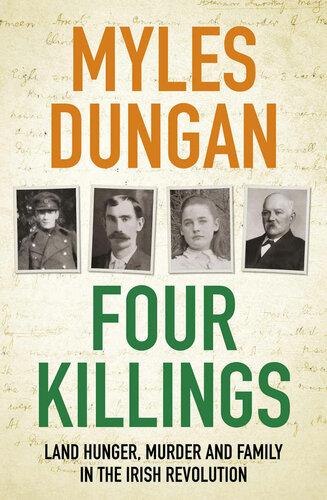

Most ebook files are in PDF format, so you can easily read them using various software such as Foxit Reader or directly on the Google Chrome browser.
Some ebook files are released by publishers in other formats such as .awz, .mobi, .epub, .fb2, etc. You may need to install specific software to read these formats on mobile/PC, such as Calibre.
Please read the tutorial at this link: https://ebookbell.com/faq
We offer FREE conversion to the popular formats you request; however, this may take some time. Therefore, right after payment, please email us, and we will try to provide the service as quickly as possible.
For some exceptional file formats or broken links (if any), please refrain from opening any disputes. Instead, email us first, and we will try to assist within a maximum of 6 hours.
EbookBell Team

4.7
26 reviewsThe story of a single family during the Irish Revolution, Four Killings is a book about political murder, and the powerful hunger for land and the savagery it can unleash.
Myles Dungan's family was involved in four violent deaths between 1915 and 1922. Jack Clinton, an immigrant small farmer from County Meath, was murdered in the remote and lawless Arizona territory by a powerful rancher's hired assassin; three more died in Ireland, and each death is compellingly reconstructed in this extraordinary book.
Mark Clinton was murdered by a group of agrarian 'bandits' who resented his family's possession of some disputed acres; his killer was tried and executed by the dead man's relatives and comrades in the Meath IRA. A mentally challenged youth was shot as an informer by another relative of Dungan's, and buried in secrecy and silence.
What unites these deaths is the violence that engulfed Ireland during the campaign against the British, but also the passions unleashed by arguments over the ownership of the soil. That often brutal struggle between landless labourers and smallholders and more prosperous farmers is a forgotten aspect of the war of independence.
Myles Dungan's book, focused on one family, offers an original perspective on this still controversial period: a prism through which the moral and personal costs of violence, and the elemental conflict over land, come alive in surprising ways.
'A vivid and chilling narrative ... Confronts uncomfortable questions that still need answering' Roy Foster
'Marries acute storytelling skills with scholarship, fortified throughout by the author's wry sense of humour' Michael Heney
'A riveting story of the fortunes of an extended family' Catriona Crowe
'An engrossing account of the intimacies of political violence' Maurice Walsh